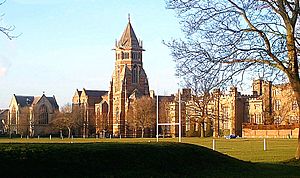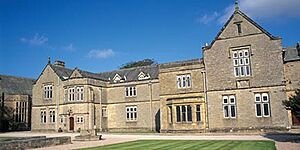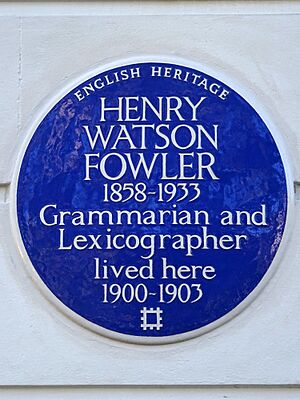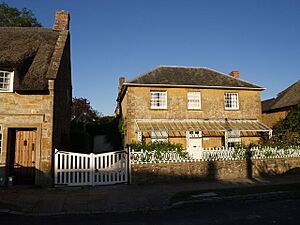H. W. Fowler facts for kids
Quick facts for kids
Henry Watson Fowler
|
|
|---|---|
| Born | 10 March 1858 Tonbridge, Kent, England
|
| Died | 26 December 1933 (aged 75) Hinton St George, Somerset, England
|
| Education | Balliol College, Oxford |
| Occupation | Schoolmaster, lexicographer |
Henry Watson Fowler (born March 10, 1858 – died December 26, 1933) was an English schoolmaster and lexicographer. He was famous for his work on the English language. People especially know him for A Dictionary of Modern English Usage and his part in creating the Concise Oxford Dictionary. The Times newspaper even called him a "lexicographical genius," meaning he was brilliant with words and dictionaries.
After studying at Oxford, Fowler worked as a schoolmaster until he was in his middle age. Later, he became a freelance writer and journalist in London, but he didn't find much success at first. In 1906, he started working with his brother, Francis. Together, they began publishing important books about grammar, writing style, and dictionaries. After Francis passed away in 1918, Henry finished their joint projects and edited more books on his own.
Contents
About Henry Watson Fowler
Early Life and School Days
Henry Fowler was born in Tonbridge, Kent, England, on March 10, 1858. His parents, Robert and Caroline Fowler, were originally from Devon. His father was a clergyman and schoolmaster. When Henry was born, his father taught math at Tonbridge School. Soon after, his family moved to nearby Tunbridge Wells. Henry was the oldest of eight children. When his father died in 1879, Henry took on a big role in looking after his younger brothers and sister.
Henry spent some time at a boarding school in Germany. Then, in 1871, he went to Rugby School in England. He focused on Latin and Greek languages. He even won a school prize for translating part of a play by Percy Bysshe Shelley into Greek poetry. Henry also enjoyed drama and debating. In his last year, he was the head of his school house. One of his teachers, Robert Whitelaw, really inspired him. They stayed in touch for many years.
In 1877, Fowler started attending Balliol College at Oxford. He didn't do as well at Oxford as he had at Rugby. He didn't get the highest grades in his main subjects. Even though he didn't play much sports at Oxford, he started a daily routine he kept for life: a morning run followed by a swim. He left Oxford in 1881 but didn't get his degree until 1886. This was because he didn't pass an exam in Divinity (religious studies).
Teaching Career
A teacher at Balliol College thought Henry would be a good schoolmaster. So, Fowler took a temporary teaching job at Fettes College in Edinburgh. After two terms there, he moved to Yorkshire (now Cumbria) in 1882. He became a master at Sedbergh School. He taught Latin, Greek, and English. He started with younger students but soon taught the oldest ones. He was respected by his students, but not always seen as exciting. He got the nickname "Joey Stinker" because he smoked a lot of tobacco.
Several of the Fowler brothers were together again at Sedbergh. Charles Fowler taught there for a short time. Arthur Fowler moved from Rugby to Sedbergh for his last year and a half of school. Later, Arthur also became a master there. Samuel, the youngest brother, was sent to Sedbergh, probably for Henry and Arthur to look after him. But Samuel only stayed a year and then left school. Henry Fowler made several close friends at Sedbergh. They often went on holidays to the Alps together.
Henry Fowler was the son of a clergyman, but he had different beliefs. He had chances to become a housemaster at Sedbergh three times. The third time, he had a long talk with the headmaster, Henry Hart. The job required him to prepare boys for confirmation in the Church of England. This went against Fowler's personal beliefs. When it was clear they couldn't agree, he decided to resign from the school.
Life in London and Writing
In the summer of 1899, Fowler moved to a house in Chelsea, London. You can still see a blue plaque there in his honor. He tried to find work as a freelance writer and journalist. He lived on the little money he earned from writing and a small inheritance from his father. In his first published article, "Books We Think We Have Read" (1900), he wrote about how some English people pretend to know certain books, like those by Shakespeare. He suggested that reading these books should be like enjoying a fine old wine, slowly and carefully. In another article, "Outdoor London" (1901), he described the sights and sounds of his new home. He praised its plants, its local people, and its magical night scenes.
Working with His Brother
In 1903, Henry moved to the island of Guernsey. There, he started working with his brother, Francis George Fowler. Their first project together was translating the works of Lucian of Samosata, an ancient Greek writer. The Times newspaper called their translation "remarkable." The Oxford University Press published it in four books in 1905. Their next book was The King's English (1906). This book aimed to help writers use simple and clear language and avoid misusing words. This book became very popular very quickly.
Fowler also published some of his own articles in books under fake names. For example, More Popular Fallacies (1904) was by "Quillet." In 1908, on his 50th birthday, he married Jessie Marian Wills (1862–1930). They had a very happy marriage, but no children.
The Oxford University Press asked the Fowler brothers to create a shorter version of the Oxford English Dictionary (OED). This became the Concise Oxford Dictionary, published in 1911. This dictionary has been printed ever since and is updated regularly.
Their next big project was an even smaller, pocket-sized version of the OED. At the same time, they were also working on Modern English Usage. Both projects started in 1911. Henry focused on Modern English Usage, and Francis worked on the pocket dictionary. Neither book was finished when World War I began.
In 1914, Henry and his younger brother volunteered for the British army. Henry, who was 56, lied about his age to join. Both brothers had to leave the army in 1916 because of illness. They then went back to working on Modern English Usage. In 1918, Francis died at age 47. He became ill during his service with the BEF. After his brother's death, Henry Fowler and his wife moved to Hinton St George in Somerset. There, he finished the Pocket Oxford Dictionary and Modern English Usage, which he dedicated to his brother.
Later Years and Legacy
A Dictionary of Modern English Usage was published in 1926. Many people consider it the best guide for writing English correctly. It made Fowler's name famous in all English-speaking countries. The Times called it a "fascinating, formidable book." Even Winston Churchill told his officials to read it. The book was so successful that the publishers had to print it three more times in its first year. It was reprinted twelve more times before a new edition was made in the 1960s.
When the first editor of the Shorter Oxford English Dictionary died in 1922, Fowler helped finish the first edition. He worked with C.T. Onions, who became the new editor.
In 1929, Fowler republished his earlier book Si mihi—! under his own name, calling it If Wishes were Horses. He also published another collection of his old articles called Some Comparative Values.
Henry Fowler passed away on December 26, 1933, at his home in Hinton St George, England. He was 75 years old.
Today, The King's English and Modern English Usage are still being printed. Modern English Usage was updated by Sir Ernest Gowers in 1965 and largely rewritten by Robert Burchfield in 1996. There is also a smaller Pocket edition available online.
A book about Fowler's life, called The Warden of English, was published in 2001. It was written by Jenny McMorris, who was an archivist for the Oxford English Dictionary. The Times described it as a "meticulously researched biography." A play about Fowler's life, called The Word Man, was broadcast on BBC Radio 4 in 2008.
Published Works
Books by Henry Watson Fowler
- More Popular Fallacies. London: Elliot Stock, 1904.
- with F. G. Fowler. The King's English. Oxford: Clarendon Press, 1906.
- Sentence Analysis. Oxford: Clarendon Press, 1906.
- Si Mihi! London: Brown, Langham, 1907.
- reissued as If Wishes Were Horses. London: George Allen & Unwin, 1929.
- Between Boy and Man. London: Watts, 1908.
- with F. G. Fowler. The King's English, abridged edition. Oxford: Clarendon Press, 1908.
- with F. G. Fowler. Concise Oxford Dictionary. Oxford: Clarendon Press, 1911 [2nd edition, 1929].
- with F. G. Fowler. Pocket Oxford Dictionary. Oxford: Clarendon Press, 1924.
- A Dictionary of Modern English Usage. Oxford: Clarendon Press, 1926. [Wordsworth Edition reprint, 1994, ISBN: 1-85326-318-4.]
- Some Comparative Values. Oxford: Blackwell, 1929.
- Rhymes of Darby to Joan. London: J. M. Dent & Sons, 1931.
- with W. Little and J. Coulson. Shorter Oxford English Dictionary. Oxford: Clarendon Press, 1933.
Articles by Henry Watson Fowler
- "Books We Think We Have Read". Spectator, 20 January 1900.
- "Outdoor London". Anglo-Saxon Review, June 1901.
- "Irony and Some Synonyms". Gentleman's Magazine, October 1901, 378.
- "Quotation". Longman's Magazine, January 1901, 241.
- "On Hyphens, 'Shall' & 'Will', 'Should' 'Would' in the Newspapers of Today". Society for Pure English, Tract 6. Oxford: Clarendon Press, 1921.
- "Note on 'as to'". Society for Pure English Tract 8. Oxford: Clarendon Press, 1922.
- "Grammatical Inversions". Society for Pure English Tract 10. Oxford: Clarendon Press, 1923.
- "Preposition at End". Society for Pure English Tract 14. Oxford: Clarendon Press, 1923.
- "Split Infinitive, &c." Society for Pure English Tract 15. Oxford: Clarendon Press, 1923.
- "Subjunctives". Society for Pure English Tract 18. Oxford: Clarendon Press, 1924.
- "Notes on fasci, fascisti, broadcast(ed)". Society for Pure English Tract 19. Oxford: Clarendon Press, 1925.
- "Italic, Fused Participles, &c." Society for Pure English Tract 22. Oxford: Clarendon Press, 1925.
- "Ing". Society for Pure English Tract 26. Oxford: Clarendon Press, 1927.
- "Comprise". Society for Pure English Tract 36. Oxford: Clarendon Press, 1925.
See also
- Popular Fallacies, Charles Lamb
 | Aurelia Browder |
 | Nannie Helen Burroughs |
 | Michelle Alexander |





